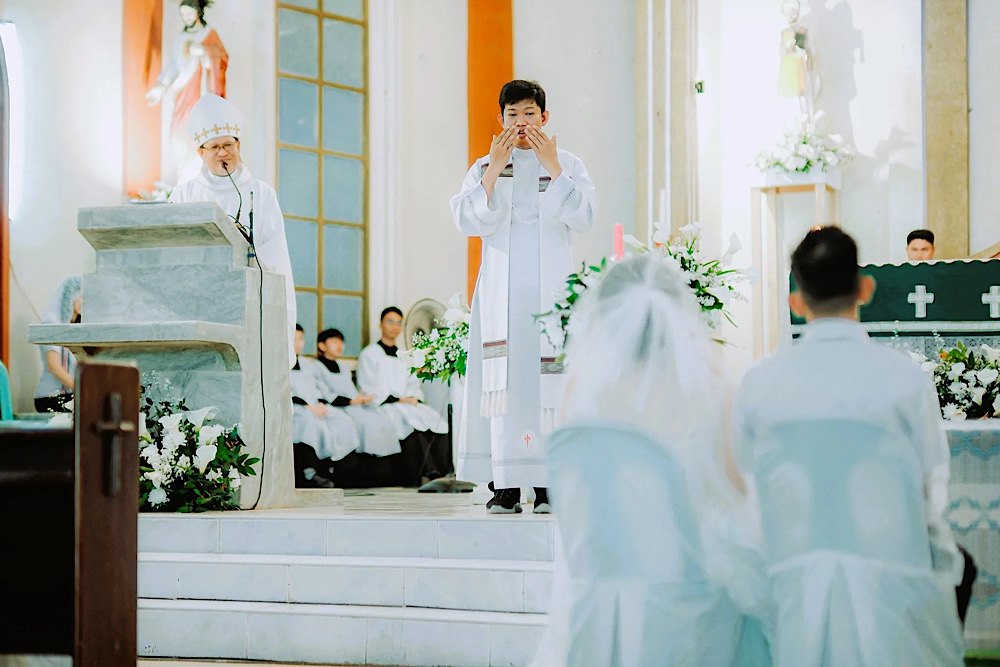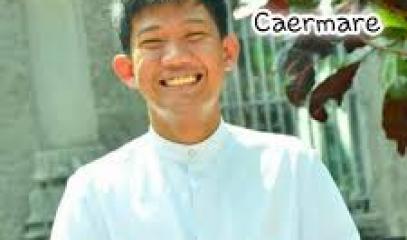Fr Caermare: the mission among the deaf of Dipolog in the footsteps of Francis
The priest is one of the few who knows the Filipino Sign Language. His choice goes back to a meeting with a group of deaf people during the papal visit in 2015. Ministering the sacraments, starting with confession, represents a challenge. Working with Setsunan University in Osaka has been a success.
Manila (AsiaNews) – Fr Khim J. Caermare is the only priest who chose to minister to deaf people in the Diocese of Dipolog, Zamboanga del Norte Province.
Speaking to AsiaNews, he said, “Little did I know my vocation took a wonderful turn: tilted from emptiness to fullness. After I resumed my seminary education, I enrolled in Filipino Sign Language and Filipino Deaf Culture at De La Salle College of St. Benilde and completed the course in 2019.”
His vocation, which dates from an encounter with a group of deaf people during Pope Francis’s visit to the Philippines in 2015, was enriched by a year in residence as a volunteer at the Special Religious Education (SPRED) programme of the Welcome Home Foundation Inc., an NGO that serves the deaf in the Philippines in education, ministry, and outreach.
Fr Caermare studied theology at Sto. Tomas University in 2021 and Philippine Sign Language. He earned a Master's Degree in pastoral ministry from the Jesuit-run Ateneo de Manila University Manila in 2018 and was ordained a priest just under three years ago, on 25 May 2022.
He is the founder and spiritual director of the Diocese of Dipolog Ministry with the Deaf, the chaplain of Diocesan Schools, and director of the migrants ministry. Currently, his pastoral duties consist, among other things, in teaching and pastoral care of students, deaf people, and people deprived of liberty (PDL), as well as assistance in administrative tasks.
Until his arrival, the diocese had no priests or religious dedicated to the pastoral care of the deaf. For this reason, since his seminary days, he has helped the deaf of the diocese to understand the meaning of the Mass and its rites. This has also helped him to ask how he can "encounter Jesus" in this type of mission.
After he got involved with the Welcome Home Foundation Inc. and following the papal visit, he pursued his studies and learnt the sign language. Part of this included explaining the theology of the incarnation to a group of deaf catechists with his slow, shaky hands.
Deaf Christians face many challenges, in matters of faith and sacraments as well, like that of reconciliation, due to the limited options in confession and the few priests who know sign language.
"Our deaf people write their confession on paper and hand them to the priest," Fr Caermare explained, while confessors use pen and whiteboards to write penance and advice.
In reality, the Church allows those who wish to communicate in sign language to make use of an interpreter, who is also bound by secrecy like the priest (Canon Law 984).
“The need for signing priests in every diocese is ever-present but often unmet. We dream of a more inclusive church where the Kingdom of God includes all who sign in an intimate sacrament where all encounter the Risen Christ,” Fr Caermare said. “As a priest, I embrace the deaf when they confess, demonstrating that God has forgiven their sins.”
What is more, the deaf do not always speak the same language as the priest and there is no shortage of criticism of the Church for overlooking the deaf because of their handicap and invisibility.
The limited number of priests does not help to meet the multiple needs, including access to the sacraments that the able-bodied often take for granted. It is no wonder that deaf Catholics are often associated with other denominations such as Jehovah's Witnesses, Mormons, and Baptists.
“We had a wonderful and successful collaborative project with Setsunan University in Osaka, Japan, last year that climaxed in the presentation of the first-ever Deaf Festival in the region,” the clergyman explained. The event sought “to bring new hope to be visualised and experienced for all generations to come, breaking the stereotypical and negative constraints of disruptive silence.”
In addition to pastoral challenges, there are also those of everyday life, such as healthcare. Deaf women have in fact a higher risk of pregnancy complications and adverse birth outcomes, including miscarriage, compared to hearing women, potentially due to barriers in accessing and understanding healthcare information.
In 2020, the Philippine Institute of Statistics (PSA) estimated that 1,784,690 people in the Philippines are hearing impaired, including deaf people, hard-of-hearing people, and those with other hearing issues.
According to the 2010 Zamboanga Norte National Statistics Office QuickStart, the province had 1,279 deaf people (334 with total deafness, 438 with partial deafness, and 507 with hearing impairments). The Diocese of Diplogo serves about 80 young deaf adults.
However, there are no data on the exact number of priests in the Philippines who know the Filipino Sign Language (FSL), although Fr Caermare is aware of some priests who have dedicated their mission to the deaf community.
21/07/2025 16:43








.png)










